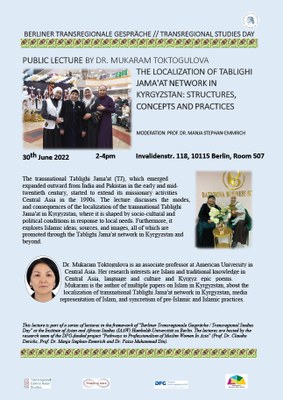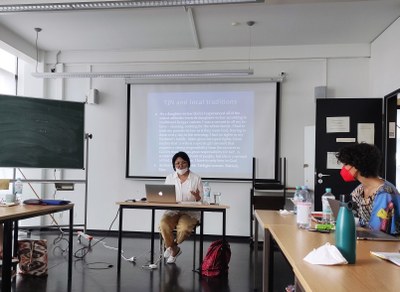Dr. Mukaram Toktogulova

30th June 2022. The localization of Tablighi Jama´at network in Kyrgyzstan: structures, concepts and practices
The transnational Tablighi Jama'at (TJ), which emerged expanded outward from India and Pakistan in the early and midtwentieth century, started to extend its missionary activities in Central Asia in the 1990s. The lecture discussed the modes,
And consequences of the localization of the transnational Tablighi Jama'at in Kyrgyzstan, where it is shaped by socio-cultural and political conditions in response to local needs. Furthermore, it explores Islamic ideas, sources, and images, all of which are promoted through the Tablighi Jama'at network in Kyrgyzstan and
beyond. The Tablighi facilitated Islamic education and consciousness for many people in Kyrgyzstan, as the country doesn’t have an extended tradition of transmitting Islamic knowledge compared to its neighboring countries. The Tablighi enabled an effective transmission of knowledge and are a good example of Muslim globalization. They bring something new, as their influence is very different from the Western or Russian influence. They also create a new image of pious, educated and active women in society.

Toktogulova Mukaram is an Associate professor at American University in Central Asia. Her research interests are Islam and traditional knowledge in Central Asia, Language and Culture, Kyrgyz Epic poems, and Kyrgyz Literature. Mukaram is the author of papers on Islam in Kyrgyzstan, where she discussed the Localization of Transnational Tablighi Jama’at Network in Kyrgyzstan, Media representation of Islam, and Syncretism of pre-Islamic and Islamic practices. She is the author of the book about Kyrgyz writer K.Jusubaliev and the editor of the textbook Research Methods in Social Sciences (in Kyrgyz). Mukaram teaches courses on Islam, Ethnography, Folklore and Language, Culture and Power in the anthropology department. She received her degree in 2001 from the National Academy of Sciences in Bishkek, Kyrgyzstan.
Dr. Toktogulova´s abstract on "the religious turn in personal development training in Bishkek: The case of seminars for "covered women"
The presentation will focus on personal development trainings led by female Muslim practitioners in Bishkek, Kyrgyzstan. The case study of the seminars for “joolukchan ayaldar (covered women) has a goal to reflect on how female leaders of the training centers translate their religious knowledge into professional activism. The paper will focus on the influence of teacher’s religious beliefs on both: the content of the courses and the professional image of the teacher. The term “joolukcan ayaldar” (covered women), which is used to refer to teachers and students of those educational centers, will be analyzed as the key identity concept that symbolizes moral values and principles of those female trainers. “Joolukchan” means a faithful woman, who is actively engaged in personal development education to fight gender violence, inequality, poverty, that Kyrgyzstani Muslim women face in everyday life. These training centers aim to shape a new image of female Muslim social activists, educators, who celebrate equality and success. The content of the courses will be discussed to address what Islamic knowledge and principles trainers use to improve “joolukchan ayaldar's " self-confidence, leadership, and problem-solving skills, communication skills, habits for success in personality development training. In addition, the presenter will discuss how those training centers use new technologies and organize seminars in different regions within and outside of the county to extend the network of “joolukchan ayaldar”.

